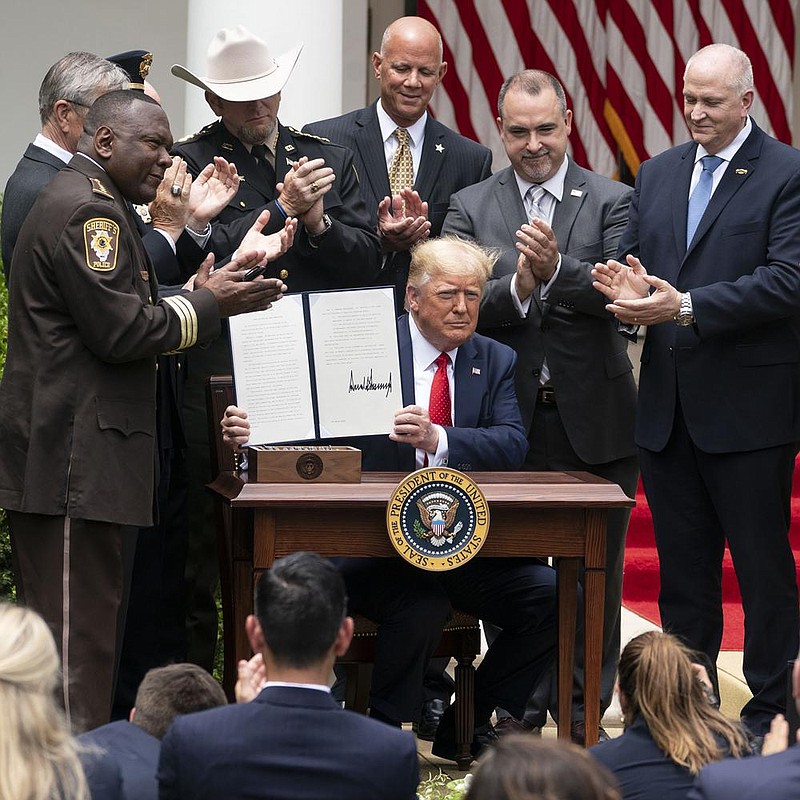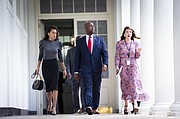WASHINGTON -- In a Rose Garden ceremony Tuesday, President Donald Trump formally unveiled steps that would offer new federal incentives for local police to bolster training and would create a national database to track misconduct, vowing that black people who have died at the hands of police accused of abuse "will not have died in vain."
The president appeared with uniformed officers and police union officials in a show of solidarity from law enforcement authorities.
Trump said he had met ahead of the ceremony with the families of black people killed by police -- Atatiana Jefferson, Botham Jean, Jemel Roberson and others -- but they did not join him for his remarks.
"I can never imagine your pain or the depth of your anguish, but I can promise to fight for justice for all of our people," Trump said.
White House press secretary Kayleigh McEnany told reporters that many tears were shed at the meeting and that "the president was devastated." Trump listed the families' relatives who died and said: "To all the hurting families, I want you to know that all Americans mourn by your side. Your loved ones will not have died in vain."
Civil-rights leaders took aim at the families that met with Trump. In response to their criticism, S. Lee Merritt, a lawyer representing some of the families, posted a photo on Twitter of himself in the White House with the mother of Jean, a Harding University graduate who was killed by an off-duty officer who entered his Dallas apartment by mistake in 2018.
"Show me the civil rights leaders who are upset about families making a direct appeal for federal intervention after the murder of their loved one & I'll show you a clown," Merritt wrote in his post.
White House adviser Ja'Ron Smith said it was "a mutual decision" for the families not to attend the public signing. "It really wasn't about doing a photo opportunity," he said. "We wanted the opportunity to really hear from the families and protect them. I mean, I think it's really unfortunate that some civil-rights groups have even attacked them for coming."
Trump's remarks came as Congress is wrestling with legislative measures to address the widespread outpouring of anger and frustration amid the protests that have roiled American cities after the death of George Floyd, a black man, in Minneapolis last month.
[Gallery not loading above? Click here for more photos » arkansasonline.com/617police/]
There have been calls from Black Lives Matter and other activists to "defund the police" by reallocating public money to social programs.
"I strongly oppose radical and dangerous efforts to [defund], dismantle and dissolve our police departments," Trump declared Tuesday. "Americans know the truth: Without police, there is chaos; without law, there is anarchy; and without safety, there is catastrophe. We need leaders at every level of government who have the moral clarity to state these obvious facts."
"Unfortunately, this executive order will not deliver comprehensive meaningful change and accountability in our nation's police departments that Americans are demanding," Senate Minority Leader Charles Schumer, D-N.Y., said. "It's weak tea."
White House officials had previewed the executive action a day earlier, and Trump offered few additional details in a 27-minute address. He touted what he has done to help minority-group communities, while accusing former President Barack Obama and former Vice President Joe Biden, the presumptive Democratic presidential nominee, of failing to try to address police brutality.
"Reducing crime and raising standards are not opposite goals," he said before signing the order, flanked by police officials.
The president departed the event without taking questions from reporters.
ORDER'S PROVISIONS
The text of Trump's order stipulated that Attorney General William Barr will be tasked with leveraging federal grant funding to encourage local police departments to pursue certifications in newly established "best practices" regarding use-of-force and deescalation techniques, including the prohibition of chokeholds "except in those situations where the use of deadly force is allowed by law."
Barr also will be tasked with establishing a database to track officers who are fired or who resign over misconduct allegations so they are not hired in other jurisdictions. The executive action also calls for the federal government to support efforts to train police officers in handling encounters with those suffering from mental health issues, homelessness and addiction, including the development of "co-responder programs" that would pair local police officers with social workers.
Trump emphasized that he is willing to work with Congress on additional measures, but his executive actions were lambasted by Democratic leaders who said the president and his Republican allies were tinkering at a time when dramatic changes are needed.
House Democrats are moving forward with a legislative package that would strictly ban police chokeholds, make it easier for victims of police violence to sue officers and departments, and create a national database of police misconduct.
The House Judiciary Committee is expected to advance the bill today, preparing it for a floor vote next week.
House Speaker Nancy Pelosi, D-Calif., in an interview on MSNBC, criticized Trump's Rose Garden event as "a photo op" and said the executive order "fell sadly and seriously short." She also faulted Senate Majority Leader Mitch McConnell, R-Ky., who on Tuesday rejected the House proposal as a nonstarter and called it "typical Democratic overreach."
"How many more people have to die from police brutality?" Pelosi said. "And so for the leader of the Senate to say, 'It's going nowhere; we don't want any of that,' is really disgraceful, and it really ignores the concerns of the American people."
Kristina Roth at Amnesty International USA said the order "amounts to a Band-Aid for a bullet wound."
GOP EFFORTS
GOP senators welcomed Trump's executive actions Tuesday. They gaveled open a Judiciary Committee hearing on "police use of force and community relations." And today, they are set to unveil their own package of proposed changes on police practices and accountability.
Democrats warn that effort does not go nearly far enough to meet the moment.
"We are at the point in the United States where we are at a crossroads," said Sen. Cory Booker, D-N.J., a co-author of a sweeping Democratic police overhaul package, as he led colleagues in a series of speeches in the Senate.
With the House moving forward on the Democratic package, and Republicans rushing to vote on the GOP plan in the Senate as soon as next week, the two proposals are on a collision course as Congress seeks to show voters it hears the demonstrators marching in the streets.
Trump vowed a "big moment" if lawmakers could act.
Sen. Tim Scott, R-S.C., who is leading the GOP effort and was among the lawmakers present at the Rose Garden ceremony, has warned that there remain partisan roadblocks on key issues -- including the possibility of overturning a federal court precedent barring individuals from suing police in most instances.
Both legislative packages would establish a database of police use-of-force incidents, proposals designed to improve transparency so the public can review officers' records even when they transfer from one jurisdiction to another.
Both bills are expected to restrict the use of chokeholds to detain suspects and bolster the use of body cameras, among other measures. Chokeholds are already largely banned in police departments nationwide.
The Democratic bill from the Congressional Black Caucus goes much further by changing the federal statute governing officer misconduct to include "reckless" behavior and doing away with "qualified immunity" to make it easier for those injured by police to seek damages in lawsuits.
SENATE HEARING
Neither bill includes activists' push to "defund the police" by fully revamping departments.
At the Senate hearing, the committee chairman, Sen. Lindsey Graham, R-S.C., shared his own experiences of rarely being pulled over by the police and never being afraid if he was -- in sharp contrast to Scott's own stories as a black man being stopped by law enforcement officers even as he entered the U.S. Capitol.
Sen. Kamala Harris, D-Calif., a co-author of the Democrats' bill, said it's the responsibility of all senators to understand the nation's racial history.
"We must reimagine what public safety looks like," Harris said.
The president of the Leadership Conference on Civil and Human Rights -- an influential umbrella group with close ties to Democratic leaders -- told the Senate Judiciary Committee that the present crisis "requires more than tinkering."
"Proposals for data collection, commissions, body cameras -- these are insufficient responses to meet the moment that we find ourselves in, and more people will die," said Vanita Gupta, a former acting assistant attorney general of the civil-rights division of the Justice Department during the Obama administration. "Where we have seen these kinds of nibbling-at-the-edges policies implemented, we continue to grapple with police officers killing African Americans with impunity."
"Do you believe that, basically, all Americans are racists?" Sen. John Cornyn, R-Texas, asked Gupta at one point.
"I think we all have implicit bias, and racial bias, yes I do," Gupta replied.
"And I think we are an amazing country that strives to be better every single day," she said.
Kate Bedingfield, Biden's deputy campaign manager, responded to Trump's contention that the Obama administration had not tried to address police brutality by citing consent decrees with local police departments and an Obama executive order to limit the flow of military weapons to municipal police.
CITY MEASURES
At the White House, Trump defended the police, pointing to a "tiny" number of bad officers, and he reiterated his desire for states to use the National Guard to disrupt protests if they turn violent or include looting.
"Americans want law and order. They demand law and order," Trump said. "They may not say it, they may not be talking about it, but that's what they want."
Officers undergoing deescalation training are taught how to keep their cool, talk to people to calm them down, and use the least amount of force required. Typically the instruction includes exercises in which actors playing members of the public try to provoke officers.
"It's very clear that our police officers are to be guardians and not warriors within our communities," Atlanta Mayor Keisha Lance Bottoms said Monday in announcing she will require officers to continuously undergo such training in the wake of Rayshard Brooks' fatal shooting Friday.
Brooks, 27, was shot twice in the back as he fled from officers after a scuffle. Brooks turned and fired a stun gun at an officer, who then fired as Brooks continued running.
A new policy will require New York City police to release all body camera footage of shootings and other instances when force is used and injury or death occurs, Mayor Bill de Blasio said Tuesday in what he billed as an additional step toward police reform.
The announcement regarding body cameras overturns a policy that gave the New York Police Department wide discretion on when it made the videos public. It came a day after the nation's largest police agency disbanded a plainclothes anti-crime unit long criticized for its aggressive tactics.
Information for this article was contributed by David Nakamura, Felicia Sonmez, Seung Min Kim and Mike DeBonis of The Washington Post; and by Jill Colvin, Lisa Mascaro, Zeke Miller, Mary Clare Jalonick, Kevin Freking, Colleen Long, Michael Balsamo, Alexandra Jaffe, Padmananda Rama, Kate Brumback and R.J. Rico of The Associated Press.

